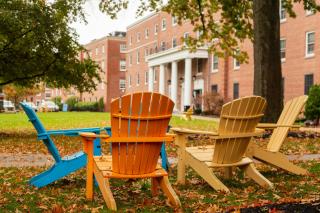Interview edited for length and clarity.
What drew you to your fields of study?
When I was first accepted to college, I thought I would major in English. However, that all changed when I read my first philosophy book the summer before I went to Simmons. It got me thinking about environmental issues and ethics. Once I became a student, I became more politically engaged and active, which I attribute to my interest in philosophy and exploring the ways that I think. Doing so brought me into the policy, political, and science spheres of thought.
The gender studies program felt like a good combination of all of my interests when it came to finding a master’s program. I was a first generation college student, so I didn't have a big sense of what college meant — I made the most of it by following all of my interests.
How did you find community while living on campus as an undergraduate student?
I was involved in a lot of the student clubs in the Student Government Association, most notably the LGBT+ group of the time and the feminist union. I found that I had the most success in social networking, and that is how I found a lot of community connections.
I balanced that with an off-campus social life, but always felt at home on the residence campus. I ended up living in a different dorm building each year so I got to know the campus well. The nature of so many fields of work being interdisciplinary among the liberal arts programs made such a tight-knit community among myself and friends.
Are you still in touch with other alumnae/i or professors?
I'm still in touch with my college roommate, despite not being able to see her for the last 20 years. Many of my friends have moved around a lot, and I think for a while people were in Boston after graduation, but folks tend to disperse. I have moved plenty of times and so I feel like wherever we are, we are still able to keep up with each other.
In 2023, to mark my class’s 20th Reunion, we organized our own little party where probably 20 people went to Thornton’s by campus, which felt like a classic and symbolic meeting spot for people. In terms of faculty, I've stayed in closest touch with Kelly Hagar from the English Department and Leanne Doherty from the Political Science Department, both of whom I saw as mentors during my years at Simmons.
What advice would you give to current Simmons students?
What I found works best was throwing myself into the course catalog and going through each option to design my schedule to be the most interesting and engaging as possible. There was a transitional phase where I had to complete the required classes in the beginning, but in doing so I found my stride and created a clear vision of what I wanted to achieve moving forward.
As I got more confident, I started pushing myself to be socially active and involved so my time felt more valuable and there was less time to procrastinate. Limiting my free time helped me narrow in a dedicated time slot for my academics, knowing there was not time to be wasted. While it may sound like an unorthodox approach, it worked well for me, and it allowed me to find time to be a hard-working student as well as someone who can jump into any situation and feel like I could talk to people and find community with them.
Gaining that confidence made me feel very comfortable at Simmons. That kind of laid the foundation for me while I was also studying philosophy, so I had a unique perspective when it came to exploring the city and looking for internship opportunities.

